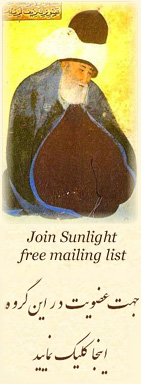Shams, in the version which Coleman Barks derived from the Arberry
translation, and in translation by A.J. Arberry:
^ ^ ^ ^ ^
"I Am Not This"
I am not this. Your beauty closes
my eyes, and I am falling into
that. You cut the umbilical with
this love that's been with me since
birth. My mother saw your mountain
reflected in my face, you that lift
coverings, you that bring death. We
agreed on this before creation. I've
been so hidden. Ask my body who I
am. It says "solid ground." Ask my
soul. "Dizzy as the wind." Neither,
I stand here facing Shams of Tabriz.
-- Version by Coleman Barks, with Nevit Ergin
"The Glance"
Viking-Penguin, 1999
~~~~~~~~~~~~ ~~~~~~~~~ ~~~
I have got out of my own control, I have fallen into uncon-
sciousness; in my utter unconsciousness how joyful I am with
myself!
The darling sewed up my eyes so that I might not see other
than him, so that suddenly I opened my eyes on his face.
My soul fought with me saying, "Do not pain me"; I said,
"Take your divorce." She said, "Grant it"; I granted it.
When my mother saw on my cheek the brand of your love she
cut my umbilical cord on that, the moment I was born.*
If I travel to heaven and read the Tablet of the Unseen, O you
who are my soul's salvation, without you how I am ruined!*
When you cast aside the veil the dead became alive; the light
of your face reminded me of the Covenant of Alast.*
When I became lost, O soul, through love of the king of the
peris, hidden from self and creatures, I am as if peri-born myself.
I said to the Tabriz of Shams-e Din, "O body, what are you?"
Body said, "Earth"; Soul said, "I am distraught like the wind."
-- Translation by A. J. Arberry
"Mystical Poems of Rumi 2"
The University of Chicago Press, 1991
* "the moment I was born" -- To experience divine love is a
spiritual regeneration or birth for a Sufi. This is why the soul
in the world is compared to the embryo in the womb, and when it
becomes a babejust born into a new world. Cf. Math. notes, 1: 19,
3180. Rumi says that such a love was inborn in him and from the
beginning he embarked on his Sufi mission. "On that" refers to that
love. It was a common superstition that if, while cutting the
umbilical cord, one made a wish, the child would attain it.
* "Lawh-e gayb" (the Unseen Tablet) seems to be the same as
"lawh-e mahfuz (the Preserved tablet, Quran 85:22) which refers to
the Quran. It is said to have been in heaven before its revelation.
The Sufis interpret it as the First Intelligence (aql-e avval) or
Logos or the Active Intellect (aql-e fa'al). See Sajjadi, "Farshang-
erfani", 405, and Nicholson's note on Math. 1:296.
* Covenant of Alast: "Alastu bi rabbikum?", "Am I not your Lord?"
(Quran 7:171). Thus God addressed the future generations of men
(according to the Sufis their souls). They answered "Yes", and
acknowledged God's right to judge their actions and to punish their
sins.
The media:
http://tinyurl. com/2ol9mq
^ ^ ^ ^ ^







No comments:
Post a Comment